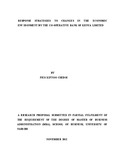| dc.description.abstract | Much of previous research into response strategies by firms to changes in the environment has concentrated mainly on the external environment as a whole. However no known local study has specifically focused on the economic environment and how it affects the strategies of the firm. This study therefore sought to fill the existing research gap by carrying out a case study on response strategies by the Co-operative Bank of Kenya Limited to changes in the economic environment. The main purpose of the study was to investigate how changes in economic factors like interest rates, inflation rates, exchange rates, international trade and CBK regulations affected the bank and how the bank amended its strategies to deal with the threats and opportunities in the economic environment.
This research was conducted through a case study with the target population of this study being the Divisional Directors of Co-operative Bank of Kenya Limited. This paper utilized an interview guide administered personally by the researcher across heads of functional Divisions in the bank. From the findings, the study established from the majority of respondents that the bank had indeed been greatly affected by changes in the economic environment.
The study further established from respondents that the bank had responded by increasing rates, concentrating more on non-funded income streams, external borrowing, restructuring loans, slowing down on lending, diversifying through
subsidiaries and globalization of its business. This study therefore recommends that in order to avoid negative effects of the economic environment. The Co-operative Bank of Kenya Limited should diversify its source of funds for lending to cushion long-term borrowers from erratic interest rates and CBK should stop over reliance on the CBR. | en |

